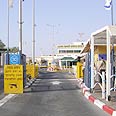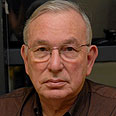A Jewish child tells his parents he hates all the Arabs.
"Don't say 'the Arabs,’” they chide. “There are good Arabs and bad ones, just like we've got good people and bad people."
"So what should I say?" asks the child.
"Say 'terrorists', or say 'Arabs' without the word 'the'," say the parents.
Sometimes the parents look to strengthen their argument: “You remember Hassan, that nice delivery boy from the supermarket; or how about Nazamiya, from the restaurant in the Galilee? They're both nice Arabs, you know."
So who's right, the child or the parents? They both are.
Animal instincts
The child is a small animal who generalizes in order to survive. Like a rabbit that suddenly sees a threatening shadow appear behind his back and doesn't take the time to check if it's the shadow of a hungry tiger or a harmless giraffe.
Rather, the rabbit runs immediately to hide from whatever is behind him.
And so does the child. He is motivated by the same primal instincts that allow animals to make the correct decisions from a statistical point of view, thus increasing their chances to survive in an environment of great uncertainty.
Generalizations are a biological characteristic deeply rooted within us.
One could say the fearful child is "political"; that is to say, he is given to judging people by the clear signature of their collective identity, whilst the "enlightened" parents are "politically correct", because they resist such generalizations and try to judge each person as an individual.
The root of the difference between us and children is embedded in our power to discern and our life experience.
Our power gives us time to take in information, and our experience helps us determine whether a particular danger is imagined or real, and whether it is worthwhile to expend resources responding to a minimal threat.
Trusting others
Usually, the "enlightened" are people who have become accustomed through their life experiences to trusting others, but when statistics point to a truly imminent threat, even the "enlightened" change their stance and become "political."
We do not respond directly to the level of threat, but rather we draw on tremendous storehouses of confidence.
Our suspicions, and from them our generalizations and primal intelligence, develop much faster than real threats.
Thus, individual Arabs become "the Arabs," and particular Jews become "the Jews."
The child within us wins.
Policy issues
Generalizations and their opposites are not only a private issue. They also affect policy.
The struggle between Jews and Arabs is political, but alongside the recognition of this fact was also the opposite phenomenon in the Zionist movement, which saw the Palestinians as individuals rather than as a collective.
This approach, which in a certain way could be described as "enlightened," made it possible for us to ignore the gnawing thought that our dispossessed neighbors were working against us as a nation.
Because we saw them as a collection of individuals, we were able to claim the "good Arabs" were being exploited by the "bad Arabs". Thus, we were able to pass up negotiations with Palestinian representatives while pointing out at the same time just which "good" Arabs we would be willing to speak with.
It is no coincidence that this "enlightened" narrative is today being heard by extremists on the right and the left.
The former – usually the more humane settlers – "recognize the neighbors from the nearby village," and are sure that if the "bad guys" would just stop intimidating them and they could speak freely, they would welcome the advances and income we bring to them.
On the other side, pure-hearted leftists view Palestinian terrorists as poor sacrifices, and say, "after all, they too are human beings."
This is, of course, true, but the phrase has no political meaning. Groups of human beings does not act as one, and relating to a collective cannot be decreed to be "one on one" for the mere fact that we were all created in the image of God.
Territorial questions
Where am I going with all this? To the question of territory.
A person who lives in a territory with people similar to himself is less suspicious of others, and frequently it is the process of interacting, rather than distancing, that produces fertile ground for generalizations.
In contrast, a person who lives in an environment in which many people are defined as part of a dangerous collective can often paint all the "others" similar characteristics and unified goals. An Arab becomes "this Arab"; a Jew becomes "this Jew."
This is how animals behave and this is how Jews and Arabs and Chinese and Americans and all other peoples behave.
This is one reason that a nation needs its own territory and borders.
Utopians dream of a world without borders, but the truth is that when we have borders, we are more humane, and less animal-like.

















